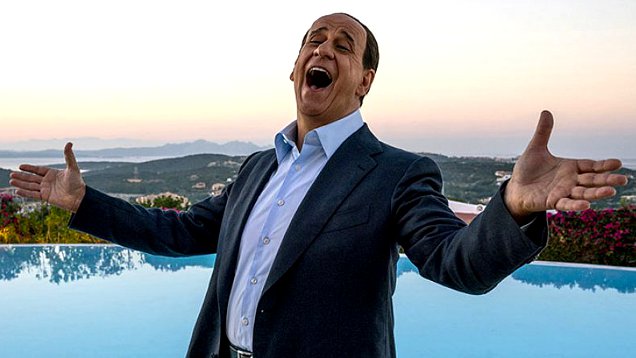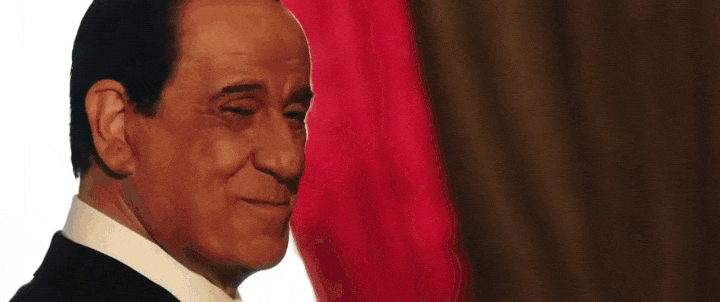Loro is an arresting and damning portrait of power and wealth

Italian director Paolo Sorrentino makes decadent and intoxicating dramas. His new film about the life of former Prime Minister of Italy, Silvio Berlusconi, is no exception, writes Sarah Ward.
Whether following a sexagenarian taking stock of his life, an ex-rocker struggling with his retirement or two 70-something pals relaxing at a Swiss resort, Paolo Sorrentino makes movies that intoxicate the eyes. In The Great Beauty, This Must Be the Place and Youth alike, his films present distinctive, decadent worlds that prove so richly staged and shot that viewers could lose themselves in each frame. Thanks to the Italian writer/director’s ten-episode papal drama The Young Pope, which will receive a follow-up this year, he weaves the same vivid visual magic on the small screen as well.
Whichever medium he’s working with, Sorrentino’s lush style always serves a purpose. How better to understand his subjects than to dive deep into the images and accoutrements – the spaces, places, items, objects, parties, people, fashion and fun, in most cases – that make his characters who they are?
With Loro, which translates to Them in Italian, Sorrentino once again does what he does best. A two-part film upon its release on home soil, then condensed to a single two-and-a-half hour feature for its international screenings, his latest movie recreates the excess surrounding one of 21st-century Italy’s most infamous figures. Set between 2006 and 2009, and with wealth and indulgence shading every moment, it’s a biopic of media tycoon turned four-term Prime Minister Silvio Berlusconi – and, mimicking the man at its centre, it shows no signs of restraint. Like corrupt politician, like colourful, voyeuristic, keenly critical portrait.
While Berlusconi (Toni Servillo) remains Loro’s primary focus, the smouldering Sergio Morra (Riccardo Scamarcio) is the film’s point of entry. Deploying escorts to grease the wheels of power, and fond of both a cocaine bump and a spot of bumping and grinding with whoever he can find, the young wheeler-and-dealer has his sights set on getting into the ex-PM’s inner circle. Befriending the out-of-power politico’s main mistress Kira (a tragic Kasia Smutniak), Sergio hatches a scheme to rent a Sardinian villa neighbouring Berlusconi’s, fill it with bikini-wearing women plied with booze and drugs, and wait for attention to come his way. Although his target is trying to play happily families and scheme his way back to the top, the plan works.

Penning Loro’s script with his regular co-scribe Umberto Contarello, Sorrentino has time for the details of Berlusconi and Sergio’s lives – matching unhappy wives (Elena Sofia Ricci and Euridice Axen), mirrored ambitious streaks, comparable feelings of emptiness and a shared lack of scruples all included. Indeed, while the filmmaker is a master at painting splashy, insightful pictures in a near-hypnotising fashion (a feeling that the film’s EDM-littered soundtrack enhances), he’s just as skilled at ensuring that the minutiae means something. Every soiree, sexual encounter and steely glint in Berlusconi and Sergio’s respective eyes equates to desire untamed in an equally alluring and devastating way, and that’s by design. The film reels viewers in with the lushness of cinematographer Luca Bigazzi’s gliding imagery, with lithe editing by Cristiano Travaglioli that wouldn’t feel out of place in a music video, with Scamarcio’s unfettered magnetism, and with the enticing atmosphere of people wanting more, while making its judgement plain.
Thematically, it’s familiar territory for Sorrentino, who recreated the life of an Italian Prime Minister in Il Divo and pondered the vacuousness of hedonism in The Great Beauty, both of which starred his regular lead Servillo. The satire and savagery, largely stemming from immersion rather than uttered condemnation, feels like Loro’s own beast, however. One pointed line sums up the movie commandingly: “What did you expect: to be the richest man in the country, become prime minister and be madly loved by everyone too?”, Berlusconi is asked. His answer is yes, obviously. Of course, this notion is apparent anyway, in a film that disappears into its subject’s world in order to dissect it, and that oscillates between its two main characters to flesh out an image of Italy where all that shines is also inescapably tarnished.
Surrounded by scantily clad, gyrating women more often than not (a necessary aspect of telling this tale, and one that makes its own sharp statement about the nature of power and success), Servillo and Scamarcio are up to Sorrentino’s task. It’s possible to elicit intrigue, to almost spellbind the audience, and to also refuse to invite sympathy at the same time, a feat that both actors achieve.
But where Sorrentino truly packs a punch, and Servillo along with him, is in Loro’s two quietest moments. For all of the gloss and glow – and inherent commentary on its false lustre – evident in Loro’s bath of excess, seeing Berlusconi trying to recapture his mojo by calling a stranger at random and selling non-existent real estate couldn’t be more haunting. For all of the obscene extremities of money and status peppered throughout the feature, seeing him rebuffed by the lone young woman (Alice Pagani) who doesn’t want his flimsy, fake vision of happiness couldn’t be more damning.

















